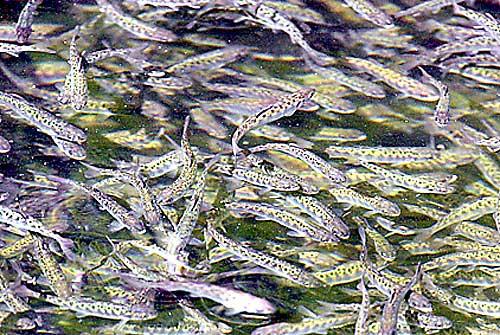forum
library
tutorial
contact

Pollsters Doubt Fish Rules Will Move Votes
by Blaine HardenThe Washington Post, May 7, 2004
|
the film forum library tutorial contact |

|
Pollsters Doubt Fish Rules Will Move Votesby Blaine HardenThe Washington Post, May 7, 2004 |
SEATTLE, May 6 -- The Pacific Northwest woke up last week to what Sen. Maria Cantwell (D-Wash.) called a "bombshell." The Bush administration had abruptly changed the rules on protecting wild salmon, the semi-sacred indicators of regional identity.
As outlined in a leaked document, the administration would count hatchery salmon, bred in concrete tanks and pumped into rivers by the hundreds of millions, when deciding whether endangered wild salmon deserve federal protection.
"The president's men are plotting a brazen flanking move around the Endangered Species Act," wrote Joel Connelly, a columnist for the Seattle Post-Intelligencer, in an overwhelmingly negative assessment that was echoed by editorials and politicians across the Northwest.
 Suddenly, it seemed, there was an environmental issue with political legs in Oregon and Washington, both regarded as swing states in the presidential race. Pollsters see a tight contest, especially in Oregon, with Sen. John F. Kerry (Mass.), the presumptive Democratic nominee, narrowly ahead but President Bush within striking distance.
Suddenly, it seemed, there was an environmental issue with political legs in Oregon and Washington, both regarded as swing states in the presidential race. Pollsters see a tight contest, especially in Oregon, with Sen. John F. Kerry (Mass.), the presumptive Democratic nominee, narrowly ahead but President Bush within striking distance.
Had Bush tripped over a fish? Might an environmental issue make a significant difference in the presidential race? The realpolitik answer, from two longtime independent pollsters in Oregon and Washington, is an emphatic no.
"There are only so many issues people can be fretful about, and right now salmon is not one of them," said Tim Hibbits, a pollster in Portland, Ore., the state with the country's highest unemployment rate. "There are these monster issues out on the table: the economy and the war," he said. "The environment is not an issue in any major way. If people don't have a job, they are not going to worry as much about salmon."
A decade ago, a regional poll found that three-quarters of those questioned agreed that if wild salmon were lost, an important part of the identity of the Pacific Northwest would also disappear.
But now, according to Stuart Elway, a Seattle pollster whose firm asked that salmon question, the economy and the war monopolize public attention, pushing environmental issues -- salmon included -- into the political shadows. "Too many things are crowding that issue out," he said. "It has been a long time since people thought the environment was enough in peril to raise it to the level of a real campaign issue."
The Pacific Northwest, for all its avowed greenness, is not unlike the rest of the country. Since the terrorist attacks of Sept. 11, 2001, the percentage of Americans who say protecting the environment should be a top priority for Bush and Congress has fallen sharply, according to the Pew Research Center. It was 63 percent in January 2001, but slid to 39 percent in 2003 before rising to 49 percent in January of this year.
"Environmental issues play much better when the economy is good, and people aren't worried about war," Hibbits said. "In a more benign climate, this salmon decision would be an issue."
The Bush administration decision on salmon appears likely to cause multiple secondary eruptions of environmentalist rage throughout the summer. Courts have ordered federal officials to decide by then whether they will remove a dozen or so salmon species from protection under the Endangered Species Act.
Many salmon biologists say the federal government has tipped its hand on this decision by announcing it will count genetically similar hatchery fish in assessing the survival chances of wild fish. They expect that a number of salmon species will be moved from the endangered or threatened list -- moves that will certainly infuriate many environmentalists.
"This will give people who don't like George Bush another reason not to like him," Hibbits said. "Bush supporters will probably like it, as they tend to be on the resource-extraction side of these issues. But it won't make any difference to swing voters, who are the key to the election. They won't decide based on salmon."
The Sierra Club's executive director, Carl Pope, agrees that the administration's new salmon policy is unlikely to tip the balance for undecided voters. But he said the policy will rile up the Democratic base in Oregon and Washington and make it more likely to vote. "This decision is the most compelling example we have to demonstrate to Northwest residents that Bush is using his imperial power to take your identity away from you," Pope said.
In a normal presidential election year, Pope said the environmental community expects that about 10 percent of the strongly pro-environment electorate would not bother to vote. But thanks to this decision, he said, "we can bring them out."
That is a prediction that Bob Moore, a Portland pollster who works for GOP candidates in the West, finds improbable. He said his polls show that while most voters do care about salmon, they do not see a distinction between fish bred in hatcheries and wild fish bred in streams and rivers.
Related Pages:
Yes, Count Wild Salmon by Les Wigen, Lewiston Tribune 5/16/4
Shift on Salmon Reignites Fight on Species Law by Timothy Egan, New York Times 5/9/4
learn more on topics covered in the film
see the video
read the script
learn the songs
discussion forum
